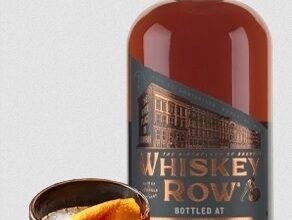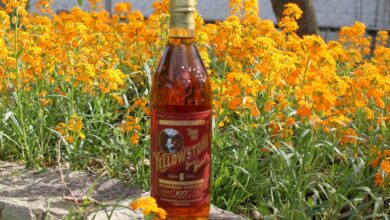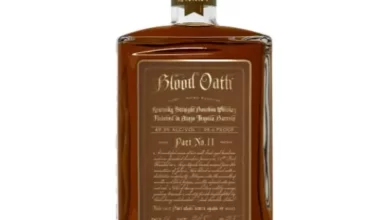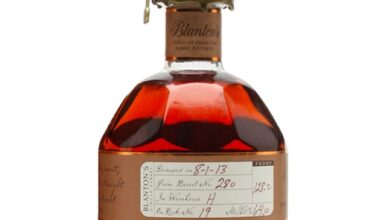Westland Sherry Wood American Malt Whiskey Review
Updated March 23, 2016
By Elizabeth Emmons
Average Rating: B

(Credit: Westland Distillery)
Westland Distillery, founded in 2010, is located in the heart of Seattle, Washington and is one of the largest single malt distilleries in the nation. It boasts of a 5,000-liter mash house that operates seven days a week, filling 10,000-liter fermenters, and a copper 7,560-liter wash still with a copper 5,670-liter spirit still. The distillery makes uses of American oak, ex-bourbon and ex-sherry casks to produce their 3 core lines of whiskey: the flagship Single Malt, Peated Malt, and Sherry Wood respectively.
Westland prides itself on using Scottish techniques, while producing unique and “thoughtfully made” (their motto) American whiskey. They value consistency along each of their lines, which is why they operate on such a large scale; small-scale distilleries cannot promise consistency in flavor as easily, if at all. Washington also offers a fairly stable climate, climate being the often unsung aspect of whiskey maturation, and this aids in this consistency.
Westland uses a Belgian brewer’s yeast (nicknamed “Jean Claude van Damme”) as opposed to distiller’s yeast for all of their expressions, which is supposed to give them their fruity flavor profile. They also experiment with different grains, with a focus on Pacific Northwest grain, for each of the offerings. The local grain is mostly grown in Skagit Valley, none of the barley is GMO, and the water they use is from the Cedar River Watershed, one of the last sources of any major U.S. city of unfiltered water. Notably, Westland has even purchased their own 60-acre peat bog. Ultimately, Westland aims to reflect their Washington locale, just as Scottish whisky often reflects its surroundings.
The Whiskey
The Sherry Wood is a non-age statement and contains 6 malts in the mash: Washington Select Pale, Munich, Extra Special, Pale Chocolate, Brown and Peated. These are roasted at different degrees to achieve the desired flavor. The whiskey is aged in ex-Oloroso and ex-Pedro Ximénez hogsheads and butts, as well as ex-bourbon and heavy char new American oak casks. Westland has a long-standing relationship with a family-owned team at Tonelería del Sur in Montilla, Spain, which supplies Westland with their decades-old sherry casks from Pedro Ximénez and Oloroso. It is then bottled at 46% abv, or 92 proof.
The Sherry Wood is a dark copper in the glass and is fairly oily when turned in the glass. Legs and drops only form distinctly about a minute later inside the glass. The nose is dusty and soft.
Conversely, the taste is heavy and dark due to the grain used, and this is amplified by the sherry casks. For me, this whiskey has an unlikable aggression that is difficult to dissect, but there is a clear, strong oak influence and a heavy sweetness that is reminiscent of cherries soaked in mediocre brandy.
Contrary to many reviews and awards it has received, I feel that the whiskey is not balanced, smooth or subtle enough to enjoy neat. The finish is also aggressive and lingers in an unpleasant manner; I even detected a bitterness there (or perhaps that was the tartness of the grapefruit Westland refers to in its own notes).
That being said, a few drops of water did improve the taste moderately as it broke up the different elements and I was able to taste the more subtle sweeter notes hidden in there. Overall, my impression of this whiskey was an unfortunate discovery considering the hard work and impressive attention to detail Westland clearly makes with the creation and distillation of its releases.
To its credit, I can see this whiskey being a good mixer, however, since it is so aggressive and would stand out nicely in a whiskey sour or hot toddy.
Addendum By Father John Rayls
The legs on this whiskey are medium to long, although the whiskey leans towards the thin side. The color in the glass appears to be a light amber with golden hues. It swirls easily and leaves the droplets near the top of the swirl marks.
You will quickly pick up notes on the nose of grain and wine, and from its background one shouldn’t be surprised by that. The aromas then reveal themselves as oatmeal raisin cookies and crushed fresh fruit accompanied by some very light oak.
The first thing you will notice when tasting the whiskey is an immediate creamy feel in the mouth, so much so that it actually surprised me. Nothing in the look or aromas of the Sherry Wood Whiskey led me to expect that mouthfeel. Much of the taste is experienced at the back of the mouth with the medium to long finish moving towards the front of the mouth remaining on top of the tongue but stopping short of the tip. The flavor is of sweet grain, baking spices and dried fruit. The finish produces multiple waves of flavor, but it’s not an intense experience.
The Price
A sampling of prices with online retailers showed some variation, with a range of $55 to $79 for a 750ml bottle.




